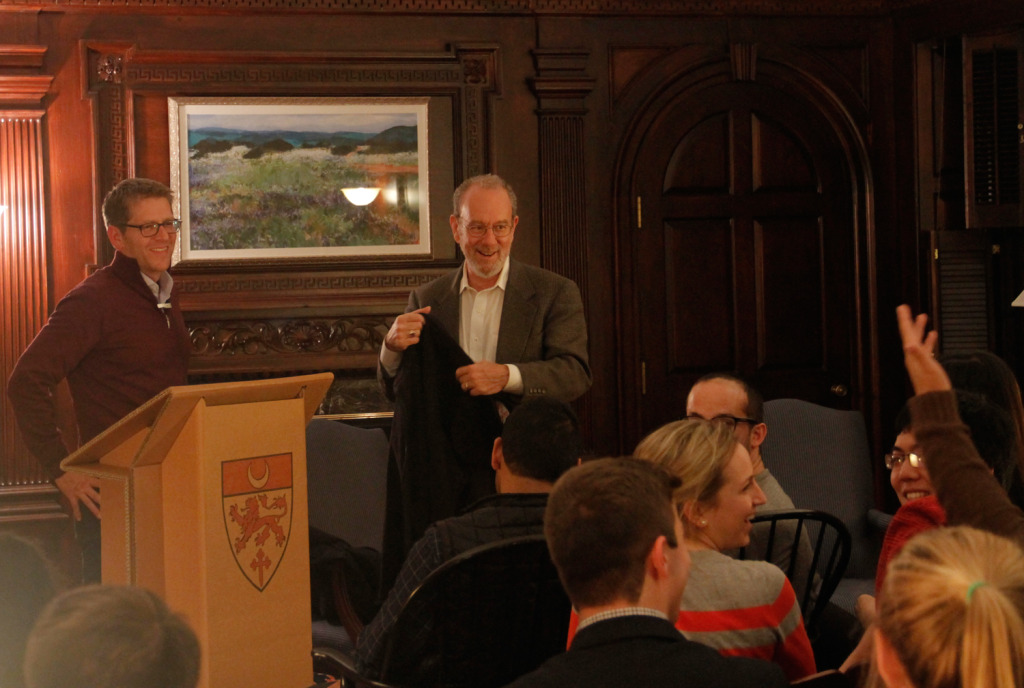Speaking to a packed room of Timothy Dwight students yesterday, Jay Carney ’87 traced his path from arriving as a freshman at Yale to becoming the White House press secretary under President Barack Obama for three years.
The Master’s Tea was only open to students in Timothy Dwight, partly because of the overwhelming interest in hearing Carney among Yale students, according to Timothy Dwight Master Jeffrey Brenzel. Although efforts were made to keep the event intimate, Carney said he is not a shy public speaker.
“I’m most comfortable at a podium,” he said.
While at Yale, Carney was in TD and wrote for The New Journal. During this time, Mikhail Gorbachev came to power in the Soviet Union, and what seemed to be a static political situation in Russia began to crumble, Carney said. He added that this inspired him to pursue a degree in Russian Studies. After graduating, Carney worked briefly at the Miami Herald, but was quickly hired by Time Magazine and sent to Moscow where he covered the decline and demise of the Soviet Union from 1989 to 1993. After leaving Russia in 1993 Carney said he began covering American politics in Washington, D.C.
Carney said his path to becoming the chief spokesperson for the 44th president was unique. Whereas most press secretaries before him had been either politicians or in the president’s inner circle, Carney came to his job as a journalist.
When Obama finally invited him to the White House and offered him the job, Carney said he was wary of how quickly White House press secretaries turn over. Robert Gibbs, his predecessor, held the job for only two years.
“My career trajectory didn’t have a great history to it when I took over,” Carney said.
Carney went on to describe the turbulent and stressful environment he worked in while at the White House. The Benghazi attacks, the faulty rollout of HealthCare.gov and the Newtown school shooting were all issues Carney spoke to the press about during his three and a half years in the position.
His time in the White House, he said, was like “trying to stand up in a hurricane.” But he added that it was the best possible job.
Carney discussed a humorous encounter with the Queen of England in which she told Carney that he had “the hardest job” while President Obama was standing next to him.
After he finished speaking, Carney took students’ questions, joking that he is “comfortable answering questions.”
When asked about the current state of journalism, Carney said that because of diminishing budgets and staff for mainstream news organizations, he is generally pessimistic.
Questions from students ranged in topic from changes in the way the White House uses social media sites like Twitter and Facebook to the increasing polarization of American politics.
Students interviewed said Carney spoke candidly and eloquently.
“I thought he was more candid than he had to be,” William McGrew ’18 said. McGrew added that he felt Carney did not cover anything up and that the talk shed light on many interesting dynamics in the Obama administration.
Corey Malone-Smolla ’16 said she felt Carney was extremely collected in his thoughts, and that he expressed his political views in a very subtle way.
TD Operations Manager Bob Kennedy ’75 said Carney’s story was perfect for Yale students, especially those in TD, to hear.
Near the end of the talk, Carney reminisced about moving into Entryway E of Timothy Dwight as a freshman at Yale, winning the Tyng Cup and getting involved in picket lines to protest for pink-collar workers. He said that Yale exposed him to politics and the way political policies impact peoples’ lives. Many of his political views were formed at Yale, he added.
Carney won the Gerald R. Ford Prize for Distinguished Reporting on the Presidency in 2003.








